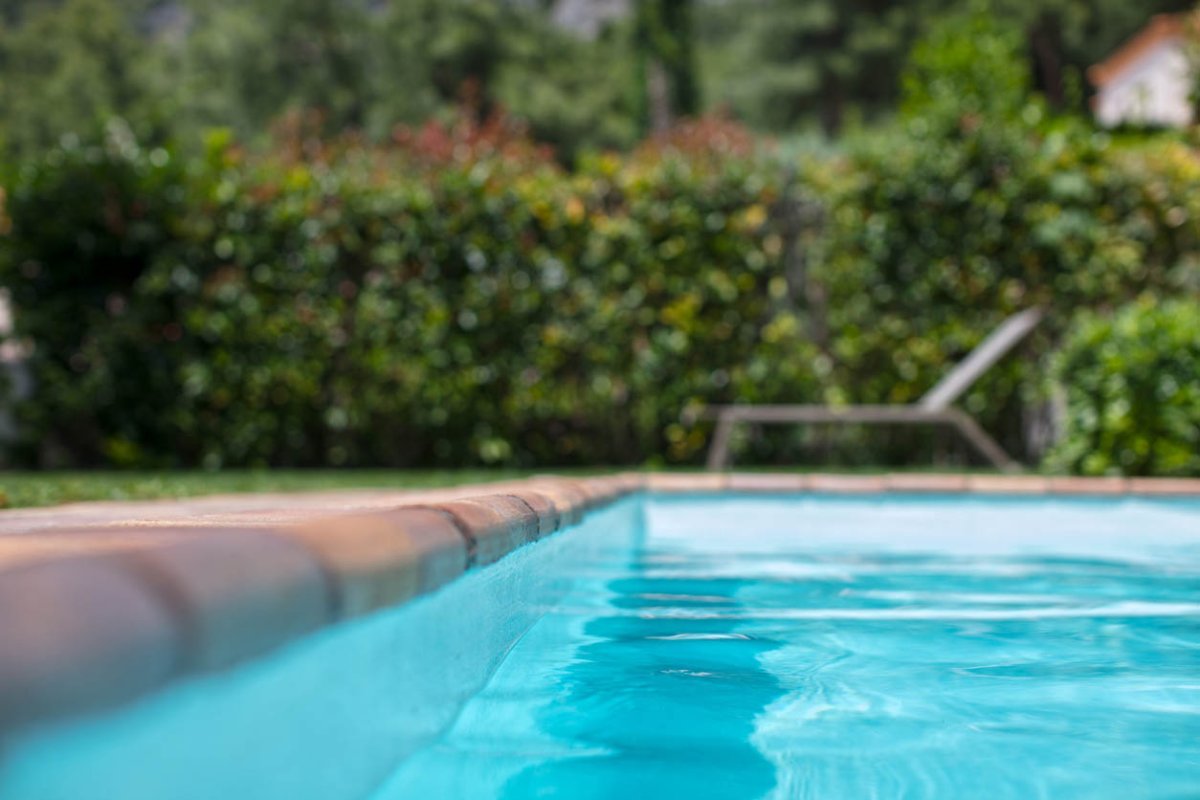We may earn revenue from the products available on this page and participate in affiliate programs. Learn More ›
Highlights
- The typical range for pool heater costs is $1,771 to $4,065 with a national average of $2,914.
- Pool size and type, heating unit type, labor, geographic location, and climate are the determining factors in how much installing a pool heater will cost.
- The benefits of a pool heater include year-round enjoyment, maximum use of an investment in a pool, and enhanced health.
- If the necessary utility hookups are already in place, an ambitious homeowner may be able to install a pool heater themselves. However, putting in utility lines must be done by a certified professional.
Nothing ruins the mood of a pool party faster than a cold pool. Fortunately, there’s an easy fix: a pool heater. The cost of a pool heater is quickly outweighed by the benefits of enjoying the pool more often. There are a few kinds of pool heaters to consider, including solar, electric, gas, and propane. A pool maintenance company can help determine which pool heater is the best fit for any given pool. So how much does it cost to heat a pool? According to Angi and HomeAdvisor, a typical pool heater cost ranges from $1,771 to $4,065, with a national average of $2,914. This guide will explore the benefits of pool heaters and let homeowners know what to expect when budgeting for pool heater costs.
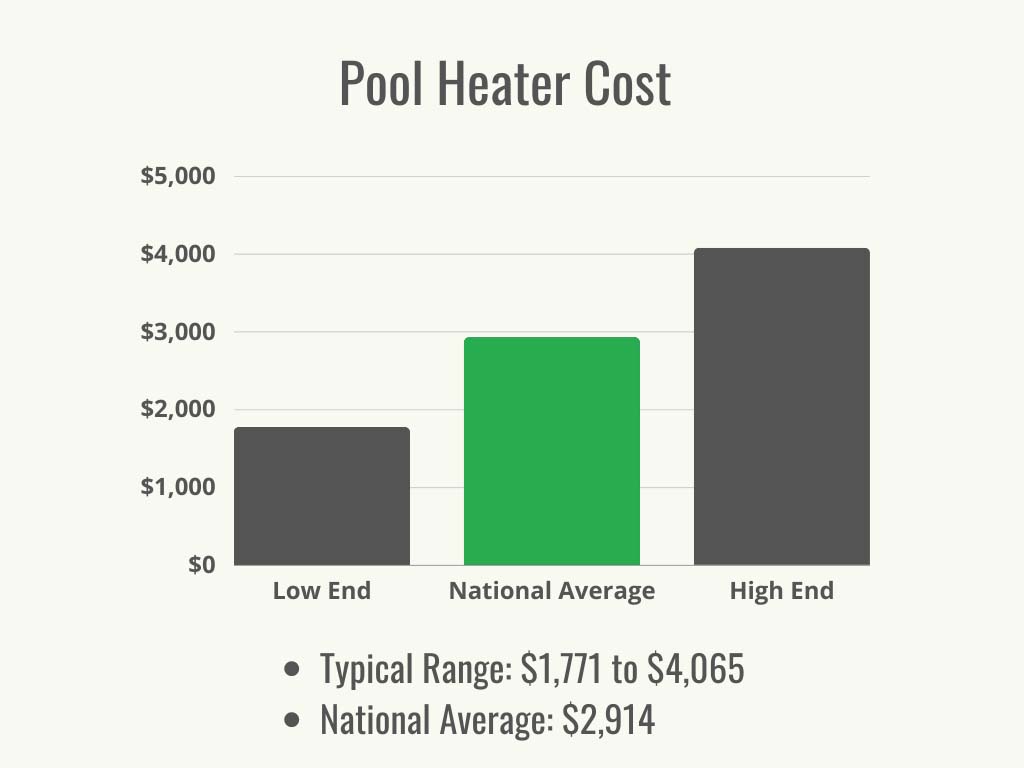
Key Cost Factors
Fortunately, understanding pool heater installation costs is much easier than trying to estimate the cost of an inground pool. This is especially true if the original construction prepared the hookups in anticipation of adding a pool heater. In this case, all that is needed is to determine the type of pool heater to purchase, which is based primarily on location, climate, and the size of the pool, and then let a pro handle the rest.
Pool Size and Type
Most homeowners considering pool heater costs find themselves asking, “What size pool heater do I need?” That answer largely depends on the size of the pool. Pool pros estimate that for every 5,000 to 10,000 gallons of water, a pool heater needs to produce 50,000 BTUs of heat. The higher the BTU of the unit, the faster the pool will heat. In colder climates, it may be necessary to double that to get a large pool to heat within a reasonable time.
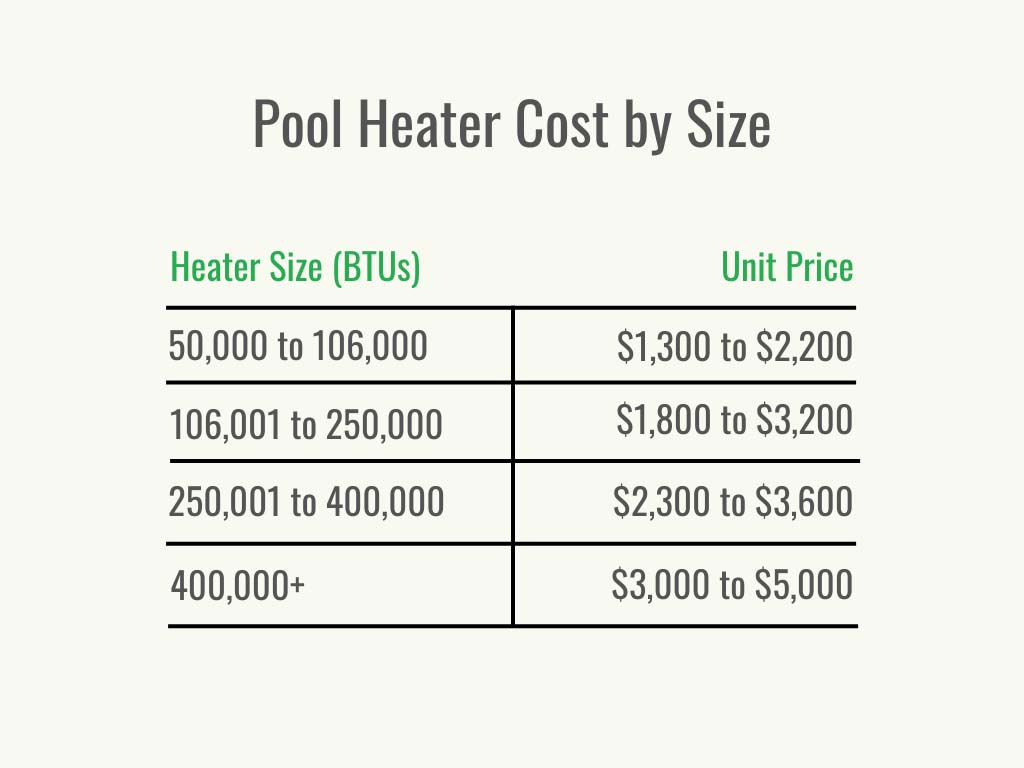
The cost of installing a pool heater will partially depend on whether it is for an inground pool, above-ground pool, or hot tub. Inground pool heaters tend to cost more because installers will need to bury the pipes underground, which requires more labor. The limited amount of space around a hot tub means that installation can cost about $450.
Heating Unit Type
There are four methods of heating that pool heaters use: solar, electric, gas/propane, and heat pump. There is the up-front cost to purchase the unit and the long-term cost of running it. The decision may rest with the heating method that works with the long-term energy costs. It might be cheaper to heat a pool using electricity in some areas, but in other areas, a gas or propane heater might be more cost-effective. Solar tends to be the priciest option at $2,500 to $9,500, and at the other end of the scale, electric costs $1,000 to $6,000. A gas pool heater costs $2,000 to $4,000 to install, and a pool heat pump costs $2,000 to $5,000. Homeowners can search for “pool heater installer near me” to find a qualified pro who can help identify the best system for their needs.
Labor
Labor accounts for less than half of pool heater costs. The typical labor fee for installing a pool heater is between $50 and $100 per hour. This cost will vary based on the type of pool heater and the potential need to have the gas or electrical system run from the house to the pool. Homeowners will also want to keep in mind that future pool inspection costs may be higher after the heater installation, because there is typically an additional cost for special equipment.
Geographic Location and Climate
The amount of sun an area gets throughout the year will also affect the type of pool heater that will be the best fit—and thus the pool heater cost. Regions with warmer temperatures have more options to choose from, since it can take a lot of energy to maintain a large pool of water at a much higher temperature. The availability of certain materials or fuels may also make a pool heater pricier in some locations than in others. Looking up “pool heater installation near me” may provide homeowners with a better sense of local prices.
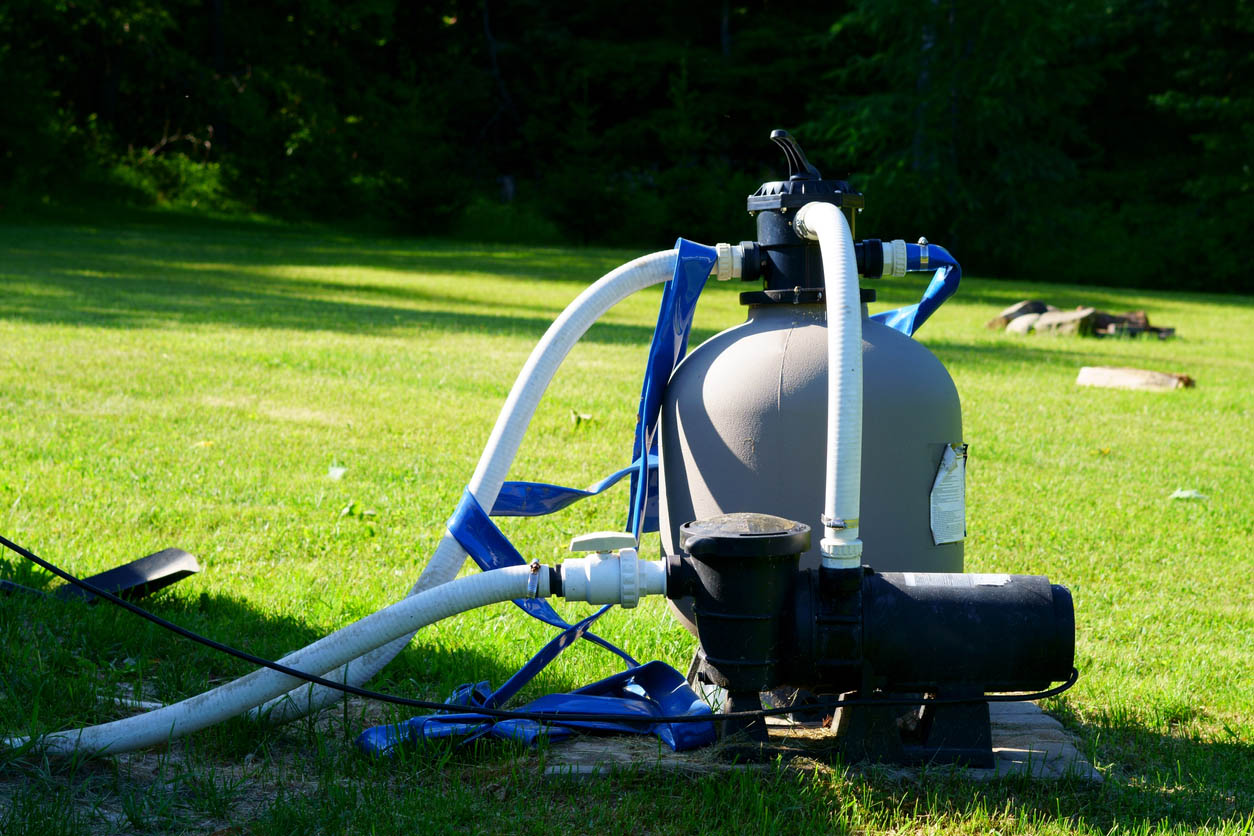
Additional Costs and Considerations
Sometimes a homeowner is looking at pool heater costs to find a replacement. Pool heater repair isn’t always an option, so a pro may need to remove the old heater. And homeowners won’t want to forget to plan for the long-term operating costs of the pool heater.
Old Heater Removal
Fortunately, the cost to remove an old heater is relatively minimal. The average cost is $25 to $50 to have it removed and dumped, but some pool heater installers will do it for free when they install the new pool heater.
Hookup Installation
If a new heater is being installed, an electrical or gas hookup as well as a water line will need to be put in. The cost for these installations ranges from $350 to $2,100.
| Hookup | Cost |
| Electrical | $500 to $2,100 |
| Gas | $350 to $800 |
| Water | $350 to $1,900 |
Any time that new utility lines and pipes are being put in, it’s reasonable to assume that permits will need to be acquired before the project can begin. Depending on what type of utility is being added, a permit for a pool heater can cost $50 to $500.
Operating Costs
There will be some operational cost involved no matter which type of pool heater is being installed. If the climate is compatible with a solar pool heater, there will still be some electricity costs to run the pump, but it’s usually only a few dollars for the month. Electric heaters might cost between $175 and $600 per month to run, and electric pumps could cost around $120 to $200 per month. Gas and propane heaters average $200 to $400 per month. All these costs are dependent on the climate, pool size, and local energy rates.
| Type of Heater | Monthly Operating Cost |
| Electric | $175 to $600 |
| Gas | $200 to $400 |
| Propane | $200 to $850 |
| Pump | $120 to $200 |
| Solar | $0 to $10 |
Winterization
In regions where winter temperatures reach below freezing, it’s important to protect the heater from the cold, as extreme cold can damage the unit. This includes making sure the heater is completely dry so that no water can freeze inside. Those who have already learned how to maintain a pool will need to add this to their seasonal checklist or schedule service with a professional. Winterizing a pool heater costs about $137 to $300.
Related Projects
It may make sense to schedule related services at the same time as a pool heater installation. For example, a pool cover costs $43 to $2,400 for manual models and up to $13,700 for automatic options. Covers can keep the pool warm to save on heating costs and also keep out dirt and debris when the pool isn’t being used. Composite decking is popular and long lasting and costs $5,100 to $11,200. A pool fence costs $1,500 to $10,000. A fire pit can add some extra warmth around the pool during cooler seasons. Fire pits cost between $240 and $2,400. Hot tubs are another way to enjoy spending time outdoors in the winter; having one installed costs $4,500 to $10,000.
Types of Pool Heaters
It may not be clear what type of above-ground pool heater or inground pool heater is the best choice, but it’s the type of heating element or fuel that really determines the kind of pool heater that’s best for the swimming pool. When reviewing pool heaters for sale, homeowners will want to consider the following differences between the available types of pool heaters and their associated costs.
| Heater Type | Cost |
| Electric | $2,000 to $5,000 |
| Gas or propane | $2,000 to $4,000 |
| Heat pump | $2,000 to $5,000 |
| Solar | $3,000 to $4,000 |
Electric
An electric resistance heater could be a good option for climates that rarely dip below 55 degrees Fahrenheit. This system uses coils to heat the water, and since it generates a lot of power, it will need to have its own electrical circuit. Electric pool heaters have a low up-front cost and can operate whether it’s sunny or not, but they have higher operating costs than other units. They are a good option for smaller pools located in warmer regions. An electric pool heater unit costs between $2,000 and $5,000.
Gas or Propane
A gas or propane heater is a popular option since they provide reliable and robust fuel to heat a pool. These units cost $2,000 to $4,000 on average and can be easily hooked up to an existing line. Gas units cost less to run each month, but propane is an easier choice for homeowners who might live too far from a municipal gas line. Both gas and propane can heat a pool the fastest—even in cold climates.
Heat Pump
A heat pump, not to be confused with a pool pump, uses electricity to operate, but it functions by collecting the hot air around it and using it to heat the water. Obviously, that means this system won’t work well for year-round use in cold climates, but it is great for homeowners who want to stretch the summer out for a few more weeks. This system will also require its own electrical circuit, but it’s cheaper to run each month than an electric resistance heater. A heat pump unit costs $2,000 to $5,000.
Solar
Solar pool heater costs $3,000 to $4,000 for the unit plus labor. This is the most cost-effective and efficient way to heat a pool, but it only works in truly sunny climates with a lot of direct sun. With little maintenance, a solar unit can heat a pool for a few hundred dollars a year, but this method won’t heat a pool quickly since it relies on nature, not fuel. This system can also last up to 20 years.
Benefits of Installing a Pool Heater
After paying the cost to build a pool and the cost of pool maintenance, a homeowner is probably wondering if it’s worth paying another few thousand dollars just to make it more comfortable. Heating a pool might seem more like a luxury than a necessity, but in many cases, it helps the pool be much more usable and functional for homeowners and their guests. The following are the top reasons that heated pool costs can be worth the cost.
Year-Round Enjoyment
Someone who has never owned a pool and lives in a warmer climate might assume that a pool will stay warm enough during winter thanks to the sunny weather. Sadly, this isn’t the case, as seasonal temperatures won’t remain high enough to keep the pool at a comfortable temperature. And for those who live in much colder climates, there are pool heaters that can get the job done despite the extra-cold temperatures. Swimming pool heaters are the best way to enjoy a dip in the deep end at any time of the year.
Maximum Use of Investment
Installing a pool or buying a house with a pool is a significant investment, so adding a swimming pool heater can make that investment pay off longer by allowing homeowners to use the pool for more months in the year. That’s the lucky part about owning a pool in cooler climates: For the cost of a heated pool, it’s possible to use and enjoy it year-round. Homeowners will just want to keep in mind that this might mean paying for a few more months of service from one of the best pool cleaning services, increasing the cost of pool maintenance.
Health Benefits
Homeowners install pools to give their families and friends a place to play and relax, but many people also install them to have a way to do low-impact aerobic activity. Swimming burns quite a lot of calories and is also easy on the joints. Pool heaters make it possible to enjoy this healthy exercise more often throughout the year.
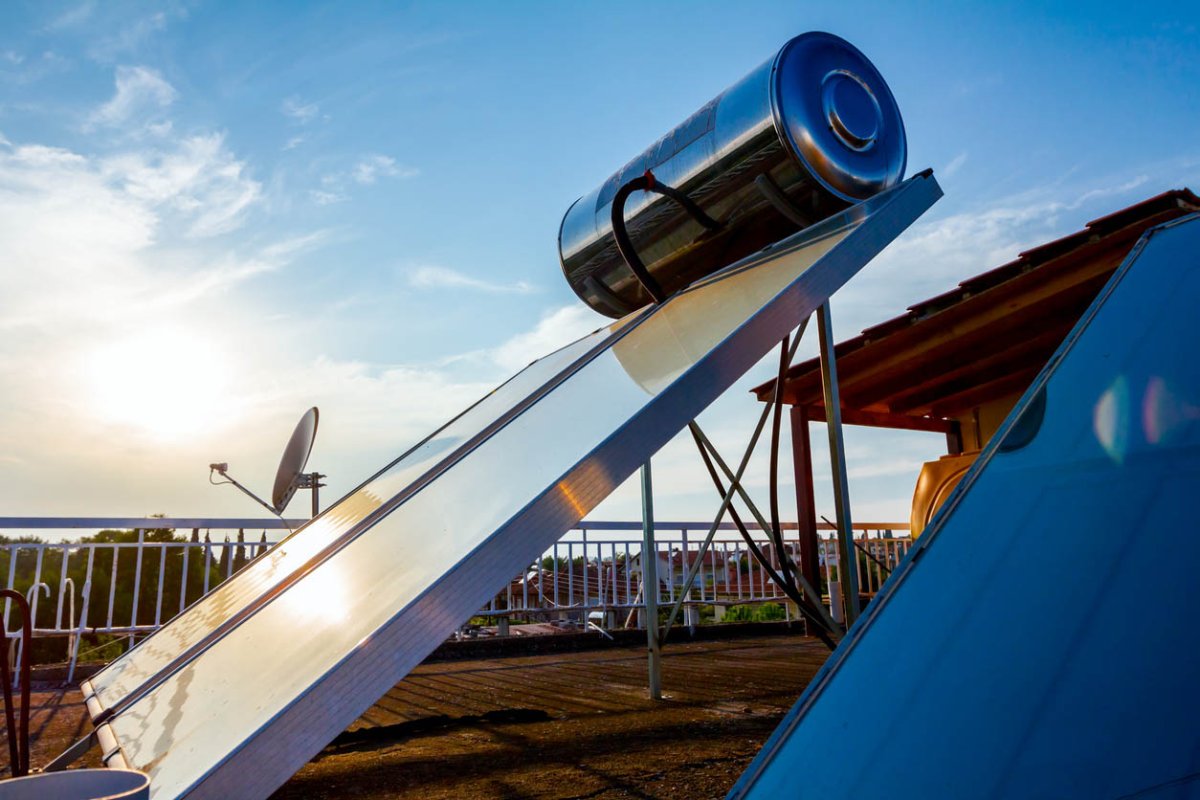
DIY vs. Hiring a Professional
Compared to learning how to build a pool, learning how to install a pool heater may seem like a piece of cake to a homeowner. However, doing a DIY installation for a new pool heater is recommended only under a couple of circumstances: when the hookups are already installed, and when the homeowner is comfortable handling the fuel source. Some homeowners have pools installed with all the necessary electrical wiring or utility pipes in place so they can simply attach a pool heater following the manufacturer’s instructions.
If this isn’t the case, then this is absolutely a job for a licensed professional or one of the best pool installation companies, since a municipality often regulates any work involving the installation of utilities. It’s dangerous work and is best done by people who have been trained and certified to handle the job. If this will be a solar pool heater, professional installers will need to calculate the correct number of solar panels, determine their placement, and get them installed for maximum benefit.
How to Save Money
Pool heating units are what they are, which means the purchase price is basically fixed once it is decided what type of unit will suit the pool best. The best way to save on a pool heater is to reduce the long-term operational costs. The following are several helpful ideas for saving money on pool heater costs.
- Use a solar pool cover. This will help raise the pool temperature while lowering pool maintenance costs.
- Bring in reinforcements. Use any kind of solar inflatable rings or heaters that can be dropped in the pool to help raise the temperature of the water.
- Choose an efficient model. Ask a pool pro about a high-efficiency pool heater to reduce monthly costs.
- Don’t skip maintenance. Keeping the heater well maintained will ensure it runs efficiently.
- Use the heater wisely. Turn the temperature down when the heater’s not in use.
- Trap heat inside. Consider purchasing an inflatable pool dome to prevent evaporation and improve heat retention.
Questions to Ask a Pro
It can be tricky to figure out what kind of pool heater is the best fit. Homeowners could be wondering what type of pool heater they need for their inground or above-ground pool, what the monthly costs will be, and how long the unit will last. Homeowners can use the following questions to help clear up any confusion when speaking with a pool heater installer.
- Can you add a pool heater to my existing pool?
- What if I don’t have hookups? How much will it cost to install the electric or gas lines?
- What kinds of pool heaters work best in this climate?
- How many BTUs will my pool require to heat it within a day or two?
- Do you offer solar pool heater installation?
- Are some units more efficient than others?
- How long will it take for this unit to heat my pool?
- Can I install this pool heater myself?
- Where will this pool heater be installed?
- What should I do to maintain my pool heater, or do you have a maintenance program?
- Can a pool heater freeze in the winter?
- Should I run my pool heater all the time?
- Who do I call if my pool heater doesn’t seem to be doing the job?
- Are there any warranties or guarantees?
FAQs
With any purchase that’s really an investment, it’s important for a homeowner to feel confident in the decision. The right pool heater can make it possible to enjoy the pool more often as long as it’s the best kind for the pool and climate. To clarify any remaining questions, homeowners will want to consider the following answers to commonly asked questions.
On average, an electric or solar pool heater should last 15 to 20 years, but gas or heat pump pool heaters usually last only 8 to 11 years.
In most cases, yes. Most pool heaters take at least a day or more to sufficiently raise the pool’s temperature, but they do really well at maintaining that temperature if they remain turned on. They’ll only have to compensate for a slight reduction in temperature rather than working hard to get the entire pool warm. Using a pool naturally reduces a pool’s temperature, so if the pool is used regularly, it’s probably best for the homeowner to keep the pool heater running.
The exception will be for gas or propane heaters. These units are powerful enough to heat most pools quickly, so it might not be necessary to run them as often.
It depends on the pool size, pool temperature, air temperature, and type of pool heater, but the average is 24 to 72 hours. Gas and propane heaters work the fastest. Cold pools in cold climates will take longer to heat than a pool the same size in a warm environment. Solar heaters are also slow to heat a pool, since they work only during daylight. Heat pumps can also heat pools within that same 24- to 72-hour period.
It’s recommended that a homeowner work with licensed and insured professionals to ensure that they are qualified to get the job done and to do it right. The pro should be familiar with all types of pool heaters and what’s best for the location to maintain the preferred water temperature. Homeowners will want to call a few pool heater installation companies and ask them questions to get a better idea of their expertise and qualifications.
HomeAdvisor, Angi, LawnStarter
